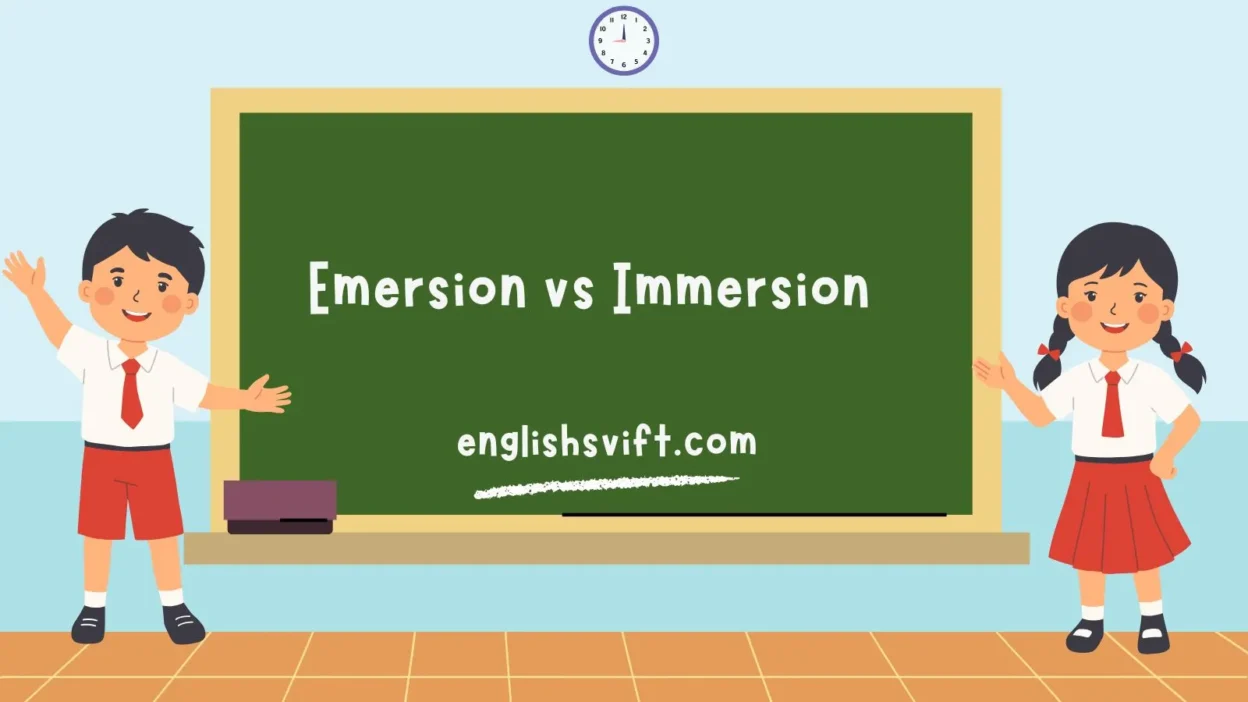Have you ever found yourself immersed in a good book or suddenly emerging from deep thought? Though they sound similar, emersion and immersion are worlds apart in meaning and experience.
From language learning to virtual reality, these terms shape how we interact with environments—real or imagined. Understanding the difference isn’t just academic—it’s practical and powerful.
Whether you’re diving into water or ideas, your approach changes everything. One pulls you in; the other pulls you out.But when should you immerse, and when is it time to emerge?
Let’s decode these terms and explore how they affect learning, technology, and daily life.
What Is Emersion?
Emersion refers to the act of coming out, rising above, or becoming visible after being hidden, submerged, or obscured. It’s often used in scientific, ecological, and psychological contexts to describe the process of emergence or return.
“The emersion of a plant shoot from the ground signals growth, life, and resilience.”
In biology, for instance, emersion describes how aquatic organisms like seaweed or marine creatures come out of the water during low tide.
Emersion Key Terms Table
| Term | Explanation |
| Emersion | Coming out or rising from a submerged state |
| Context | Science, biology, language, metaphor |
| Example | Sun emersion from behind clouds |
| Associated Actions | Revealing, rising, ascending |
| State | Previously hidden or submerged |
What Is Immersion?
Immersion means being deeply engaged, fully absorbed, or completely surrounded—either physically, mentally, or emotionally. It’s used across contexts from language learning to virtual reality and psychology.
“She was in full immersion, lost in the book’s world.”
It can also mean submersion in a liquid, like a diver in the sea, or a student in a language immersion program.
Immersion Key Concepts Table
| Term | Explanation |
| Immersion | Being deeply or fully involved |
| Use Cases | Education, VR, psychology, cultural experiences |
| Common Terms | Absorbed, surrounded, submerged |
| Example | Immersion in virtual reality simulation |
| Result | Enhanced understanding, presence |
Emersion vs Immersion: Key Definitions
| Feature | Emersion | Immersion |
| Core Meaning | Emerging from concealment | Deep involvement or submersion |
| Physical State | Rising, surfacing, becoming visible | Submerged, surrounded, enclosed |
| Psychological | Re-emerging from detachment or confusion | Fully engaged, focused, and absorbed |
| Linguistic Use | Rare, specific contexts | Common in educational and learning fields |
| Example Use | “Emersion of truth” | “Language immersion experience” |
Etymology of Emersion and Immersion
Both words stem from Latin roots:
- Emersion: From emersio, meaning “to bring out or rise”
- Immersion: From immersio, meaning “to plunge into”
Their shared root “mers” refers to submerging—but one means entering and the other exiting.
Latin Tip: Immersio = In + Mergere, Emersio = Ex + Mergere
Emersion vs Immersion in Scientific Contexts
In biology, emersion refers to the process when marine organisms like seaweed or fish rise out of the water during low tide.
In contrast, immersion is used when organisms are submerged underwater.
| Scientific Process | Emersion | Immersion |
| Organisms | Become visible above surface | Completely covered in water |
| Tidal Movement | Low tide | High tide |
| Example | Amphibians surfacing | Fish diving into deeper water |
| Application | Marine biology, ecology | Marine biology, oceanography |
Psychological States: Immersed vs Emerged
Immersion often describes the deep mental focus experienced during flow states, meditation, or art.
Emersion, on the other hand, can describe the psychological journey out of depression, stress, or confusion—like breaking through a creative block.
“Emersion feels like finally breathing after being underwater.”
Emersion in Biology and Marine Life
- Fish, seaweed, and marine organisms become visible during low tide.
- Plant shoots emerging from the ground demonstrate natural emersion.
- Amphibians experience emersion when transitioning between aquatic and terrestrial life phases.
Emersion Biology Table
| Species | Type of Emersion | Example |
| Seaweed | Tidal | Visible during low tide |
| Frogs | Life cycle transition | Emerging onto land |
| Plants | Soil emersion | Sprouting from ground |
Immersion in Education and Learning
Immersive learning is revolutionizing education. It includes:
- Language immersion programs
- Virtual Reality (VR) classrooms
- Hands-on simulations
This approach deepens comprehension by placing students inside real-world contexts.
Cultural Immersion vs Cultural Emersion
| Comparison Aspect | Cultural Immersion | Cultural Emersion |
| Focus | Submerging into another culture | Emerging from one culture to engage another |
| Activities | Language use, cuisine, local customs | Returning home and applying learned experiences |
| Depth | Full involvement in traditions and behaviors | Reflective transition and application |
Real-Life Examples of Emersion
- A writer finding inspiration after a creative block
- A gardener witnessing the first plant shoots
- A swimmer surfacing after a dive
- A musician reconnecting with their instrument
These moments of emersion are often transformative and symbolic.
Real-Life Examples of Immersion
- Gamers absorbed in a virtual world
- A student attending a French immersion school
- Travelers immersing themselves in new customs and traditions
- Chefs learning cuisine through cultural cooking classes
The Role of Emersion and Immersion in Language Learning
| Technique | Description |
| Immersion | Learning by being surrounded by language |
| Emersion | Application after learning immersion |
| Tools Used | VR tools, immersion apps, flashcards |
| Ideal For | Fluency, comprehension, practical use |
Sensory Experiences: Submersion vs Emersion
The contrast is often felt as much as it’s understood.
- Immersion: Engrossed in a concert or novel
- Emersion: Coming back to reality with new insight
Practical Differences in Everyday Communication
| Sentence | Correct Word | Why? |
| “The sun’s emersion…” | Emersion | It describes coming out of clouds |
| “Complete immersion…” | Immersion | Shows deep involvement in work |
| “Emersion from stress…” | Emersion | Emerging from a hidden state |
Grammar Tips: When to Use Emersion or Immersion
- Use emersion when referring to emergence, appearance, or rising out.
- Use immersion for complete engagement, study, or submersion.
Example: “His emersion from grief was gradual, unlike the total immersion he felt in writing.”
Emersion vs Immersion in Art and Creativity
Artists experience both:
- Immersion in the creative process
- Emersion when the artwork is completed, rising out of the subconscious
“Art is born in immersion and revealed in emersion.”
Applications in Technology: VR, AR & Simulations
- Immersive tech like VR and AR recreates real-life environments.
- Simulated environments support both immersion (experience) and emersion (debrief, analysis).
Emotional and Cognitive Impact of Being Immersed
- Boosts focus
- Encourages empathy
- Enhances learning retention
- May cause disconnection from surroundings
Use mindfulness to balance immersion with healthy emersion.
Emersion as a Metaphor: Rising Above Challenges
Emersion is a powerful metaphor for:
- Healing after trauma
- Overcoming depression
- Gaining clarity after confusion
“To emerse is to surface with strength.”
Emersion and Immersion in Professional Settings
- Immersion: Team-building, training, corporate simulations
- Emersion: Post-project reflection, strategy sessions
| Scenario | Type | Application |
| Product Launch | Immersion | Deep involvement and execution |
| Project Debrief | Emersion | Learning and surfacing insights |
Comparing States of Being: Temporary vs Long-Term
| Aspect | Emersion | Immersion |
| Duration | Often temporary | Can be sustained |
| Triggered By | Internal motivation | External context or intent |
| Impact | Reflective, liberating | Engaging, consuming |
Teaching Techniques Involving Immersive Environments
Educators now use:
- Story-driven immersion
- Role-play
- Virtual language labs
- Gamified learning
These methods create deeper cognitive engagement and retention.
How to Cultivate Emersion for Growth and Healing
- Practice mindfulness
- Schedule creative breaks
- Reflect after intense projects
- Use journaling and meditation
Table of Common Synonyms and Substitutions
| Immersion Synonyms | Emersion Synonyms |
| Submersion | Emergence |
| Engagement | Appearance |
| Absorption | Revelation |
| Envelopment | Visibility |
| Focus | Surfacing |
Summary Table: Emersion vs Immersion Key Points
| Feature | Emersion | Immersion |
| Meaning | Coming out of hidden/submerged | Deep involvement or submersion |
| Usage | Science, psychology, metaphor | Language, education, art, tech |
| Real-Life | Gardening, healing, surfacing | Reading, gaming, cultural programs |
| Grammar | Less common, poetic | Widely used |
FAQs
What is the root of emersion and immersion?
Both stem from Latin: emergere (“to bring out”) and immergere (“to plunge into”).
Can immersion be harmful?
Excessive immersion may cause disconnection; balance with conscious emersion.
Is emersion a real word?
Yes, though less common, it’s valid and used in scientific and literary contexts.
What’s an example of emersion in real life?
A butterfly emerging from a cocoon symbolizes emersion beautifully.
Which is better for learning—a mix of both?
Absolutely. Immerse to absorb, then emerse to reflect and retain.
Conclusion
Emersion vs Immersion isn’t just a matter of definitions—it’s a dual lens on experience. Where immersion pulls us into focus and presence, emersion lifts us out with clarity and renewal.
Whether in language learning, personal growth, or professional development, mastering the art of both can deepen your understanding and enrich your life.



